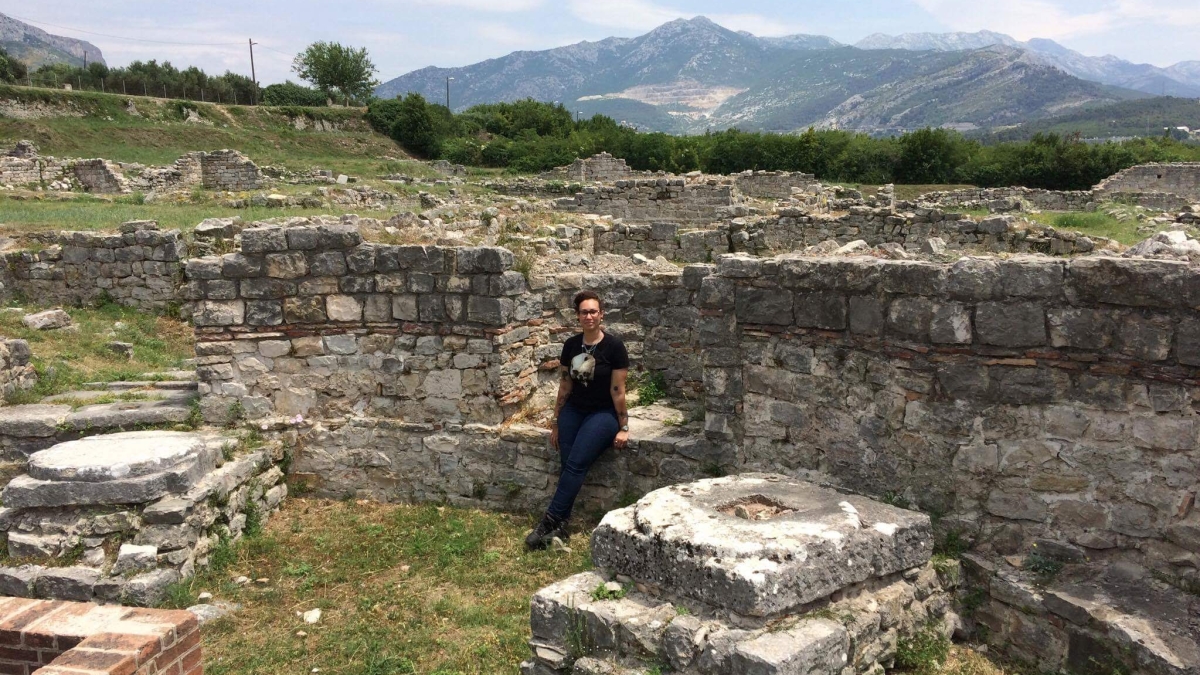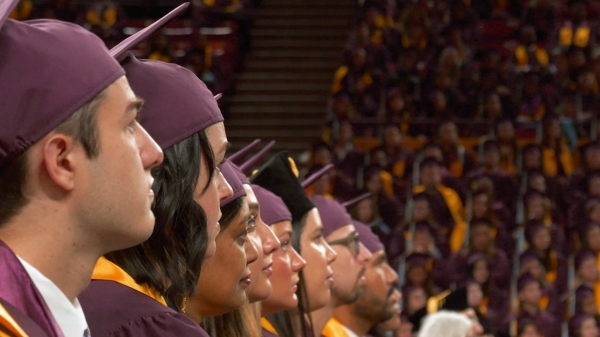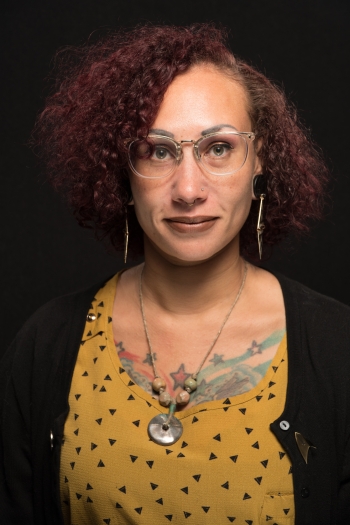Anthropology PhD student's work highlights complexity of human identities, histories

Tisa Loewen conducting fieldwork in Salona, the once capital of the Roman province of Dalmatia in modern-day Solin, Croatia. Courtesy photo
Editor’s note: This story is part of a series of profiles of notable spring 2024 graduates.
Tisa Loewen considers herself a nontraditional student.
She is older than typical U.S. college students, having previously left college and returning years later to complete her undergraduate degree. Loewen credits her tenacity and support from fellow students and women of color for keeping her going throughout her academic career.
Now, Loewen will graduate this spring with a PhD in anthropology from the School of Human Evolution and Social Change with a focus in bioarchaeology.
“My research identifies mixed populations, or groups of people who have been discussed as being of a singular ancestral or cultural background, in this case ‘Roman,’” said Loewen.
“As a mixed person, it’s important for me to show the complexity that informs how people identify or are identified.”
ASU News spoke to Loewen about her research and time at Arizona State University.
Note: Answers have been edited for length and clarity.
Question: What was your “aha” moment when you realized you wanted to study the field you majored in?
Answer: My aha moment was seeing Ken Nystrom — assistant professor of anthropology at my undergraduate institution, SUNY New Paltz, New York — talking about how bioarchaeology can help identify and assist in recognition of individuals from African American burial grounds which had surreptitiously been built over or removed from (common) memory only to be “stumbled” upon later during construction or community pressure.
Q: Can you talk a little bit about your research and why it is important?
A: I study population change in the Adriatic due to Romanization. I predominately work in Croatia and am engaging across many subdisciplines, including archaeology, biology, classical history, imperialism studies and research on social identity. ... The methods I use, in my opinion, require a deeper level of methodological and theoretical engagement than I think is the norm.
Many methods in biological anthropology have been misused, continue to be misunderstood or used flippantly and, of course, have racist histories. I think this has led to public misconceptions of human ancestral relationships and science. These methodological skeletons in our closet are either avoided altogether or rightfully criticized for their implications. But, either just criticizing the methods or just decrying their outcomes doesn’t really deal with the whole picture — which in our disciplinary legacy has been a combination of both racialist thinking and bad science. Therefore, I try to go to the “messy” areas and think about the people in the “in-between.” My research results actually discredit the typological thinking they were previously used to create.
Q: Which professor or course taught you the most important lesson while at ASU?
A: I’m very grateful that I had a lot of flexibility in my course requirements at Arizona State University. This doesn’t always work out, but since I came here with a master’s degree, I had a lot of fundamentals I didn’t want to repeat.
I learned R (programming language) in biometry, which is so valuable. Also, I found the deep engagement with really complex concepts in my population genetics class to be challenging but incredible. I have been really impressed with the openness of many professors to let me take their classes or intern with them, even though as a multidisciplinary scholar, I bring very different considerations and needs than their typical student.
Speaking of typical students — I am a nontraditional student and, in my case, I am older, in a very different part of my life, and have a nontypical orientation to education than many graduate students. I was a college dropout, and when I went back to college, I redid all my classes because I didn’t know any better.
I started with an associate degree — the second time — and worked my way up to where I am now, getting my PhD. It was extremely hard with a lot of uncertainty and sacrifice. The support I received from those who believed in me ... made all the difference. My life’s experiences have made me tenacious, so I am also grateful that my advisor, Professor Christopher Stojanowski, respected my boundaries and assertiveness.
Q: Anything else you would like to add?
A: During my time at ASU I won an NSF doctoral grant and a NASEM Ford Foundation Fellowship, for which I am so grateful. I also won an American Association of University Women award, which I had to decline for another grant, but I am still so honored.
Currently, I am a SUNY PRODiG Fellow teaching at SUNY Cortland, and I love it. I hope to continue teaching as a professor and focusing on mentorship of underrepresented and nontraditional scholars.
I also want to shout out to the Black Graduate Student Association (BGSA) and Students Identifying Multiracial/Biracial at ASU (SIMBA), both networks offer support and include amazing people who held me through some rough times.
More University news

ASU establishes Center for Free Speech, will host annual free speech forum
Arizona State University is establishing a new Center for Free Speech to encourage the uninhibited exchange of ideas, and the university will launch an annual free speech forum that will begin in…

Public affairs professor, back at ASU after 3 years with NSF, is named Sackton Chair
After three years at the National Science Foundation, Professor Mary Feeney has returned to Arizona State University, where she intends to help early-career women and women of color succeed in…

A decade strong: ASU takes top spot in innovation for 10th year in a row
For the 10th year in a row, Arizona State University is No. 1 in innovation in the newly released annual “Best Colleges” 2025 rankings by U.S. News & World Report — just one of many top rankings…
